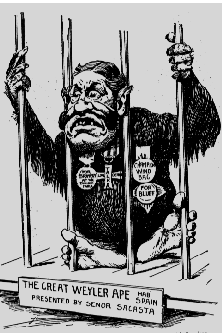Unique qualities of Cuban geography give it tremendous agricultural potential
 |
| Cuba's fertile lands |
Spain kept under tight wraps until 1760s when opened to foreign trade ships; subsequent sugar boom
Utilized best technological advances in sugar production from Jamaica and Haiti
Sugar becomes foundation of Cuba; replaces many cattle ranches, tobacco plantations, coffee estates
Focus on sugar drives expansion of railroads (to transport sugar to market) and expansion of slavery between 1770-1865
 |
| Slaves working sugar cane in Cuba |
 |
| Railroads built to transport sugar cane |
Slave numbers increase dramatically compared to white population but not ratio of other islands; why?
As sugar exporting colony, reliant on imports of finished goods
Unique relationship develops with United States (by 1877, 82% of exports to US, 6% to Spain)
By mid-1800's, Cubans developed resentment of Spanish government
- drained Cuban economy
- oppressive Spanish authorities
- abolition of slave trade (1820), 'underground' slave trade
Creole Cuban elite pitted against peninsulares
1865 - elite and planter class organize Reformist party to demand changes to Spanish rule
- reform of tariff system
- Cuban representation in Spanish parliament
- legal equality with peninsulares
- suppression of slave trade
Favorable initial response; new Spanish government in 1867 rejects and imposes harsher colonial rule
 |
| New leadership in Spanish government after Spain's Glorious Revolution |
1868-1878 - Ten Years War (series of guerilla campaigns in east for independence)
 |
| The Ten Years' War |
1880 - Spain abolishes slavery in Cuba; establishes patronato system to last years (ended 1886)
Promised political reforms never delivered
Economic problems of late 1800's - European sugar beet production, tariffs on cigars, coffee ruined by war
Number of total sugar mills drops by 40%; consolidation into fewer big sugar producers; many emigrants;
American capital begins to have increasing influence
After Ten Years War, Cuban separatists had been living in exile (many in New York); Cuban Junta
 |
| Jose Marti |
 |
| The legendary poem |
Propaganda promises a Cuban Republic free of racial and social inequality; Cuba Libre
 |
| Statue to Marti in Cuba |
1895 - Marti helps lead new rebellion against Spanish; dies in early battle (Gomez, Maceo)
Poor vs Spanish elites
Rural vs Urban
Gomez banned sugar production and burned sugar crops
1896 - General Weyler arrives from Spain to defeat rebellion; forces many peasants into concentration camps; gains upper hand by late 1896; continued guerilla warfare and refusal of rebels to surrender
 |
| General Weyler |
 |
| Weyler became the scorn of US political cartoonists |
Jan 1898 - new Spanish govt recalls Weyler; gives Cuba autonomous government; Gomez rejects anything short of full independence; Spanish army officers riot in Havana in opposition to policy
Cuban Junta engages in propaganda war in US; yellow journalism; US business interest in Cuba
 |
| Cartoon depicting Spanish abuse of Cuba |
Pres McKinley orders USS Maine to Havana to protect American lives and property; Feb 15 -explosion
 |
| Example of 'yellow journalism' following explosion on the Maine |
April 25 - US declares war on Spain
Spanish-American War lasts roughly 10 weeks; destruction of Spanish Pacific and Atlantic fleets
Dec 1898 - Treaty of Paris
- Cuba independent
- Puerto Rico & Guam to United States
US Congress est military govt over Cuba; disarm insurgents & loyalists; alleviate starvation and yellow fever; organize elections for assembly to write new Constitution
New Cuban Constitution had eight provisions stipulated by US Congress (Platt Amendment)
- Cuba would lease naval bases to US
- Cuba could make no treaties with foreign powers w/o US approval
- Cuba could not acquire debt it could not pay
- US could intervene when necessary to stabilize Cuban govt
 |
| Political commentary on the Platt Amendment |
Constitution was adopted June 1901
No comments:
Post a Comment
Note: Only a member of this blog may post a comment.